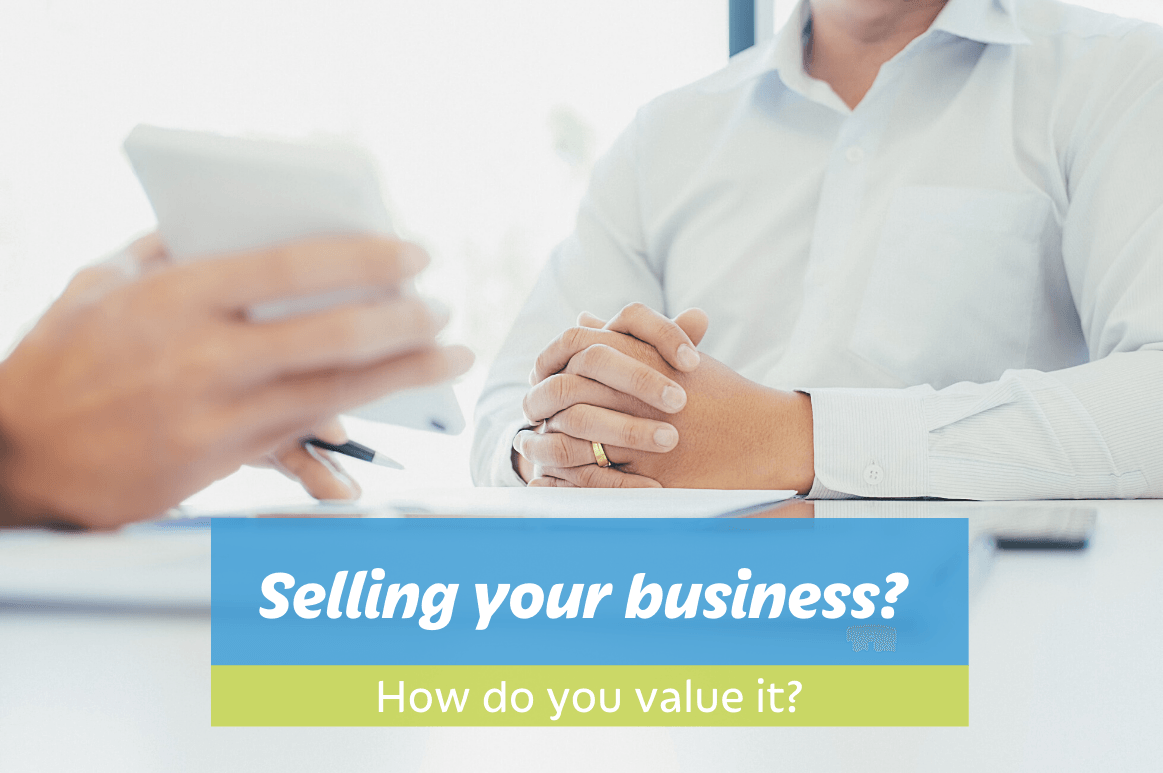Selling a business: How do you value your business?

1. Asset valuation
In an asset valuation, the market value of a business is determined by its assets — e.g. its equipment, cash and real estate. Other non-tangible assets are also valued, such as company relationships.
2. Financial evaluation/historical earnings
For a historical earnings evaluation, any debts and the gross income of the business will be considered. If you have had historical debts that you were able to pay off quickly, this can boost the value of a business.
3. Relative valuation
This method compares different companies in the same industry with similar assets against your business so you have a reasonable comparison when creating a sales price.
4. Future earnings valuation
If you can prove your profits will remain stable or increase, you can calculate the potential future earnings of your business as a method of valuation. Consider things such as your expenses, sales and losses over the past 3-5 years to determine your future maintainable earnings.
5. Return on investment method
Return on investment, or ROI, is a profitability ratio used to determine the efficiency of an investment, and therefore evaluate a company. The simplest way to calculate ROI involves dividing net profit by total assets. Potential investors or individuals looking to purchase a company can use ROI to measure the profitability of a business.
Depending on your type of business and the industry you are in, different types of valuation methods will be the norm. It’s crucial you know the most likely valuation methods your prospective purchasers or investors will use. Your accountant and business brokers can guide you here.
3 major components of a sale price:
- Goodwill: Goodwill is a non-physical asset held by a company that usually proves a business can create profit — e.g. a company's customer base, location, etc.
- Plant & Equipment: The equipment and physical assets owned by a company can improve its sales price — e.g. if a company owns heavy expensive machinery.
- Stock (at the date of sale): How much stock is for sale can affect a sales price — if a company for sale owns stock in its distribution partner, this may increase the sales price.
Remember: In a sales agreement, the above three components must be separated as they are treated differently for tax purposes.
Tax considerations in the sale of a business
Sales of businesses as going concerns, are GST-free. However, if the sale of a business involves the sale of goods associated with Australia or Australian property, GST may be taxable. Due to these complexities, always use a lawyer to prepare your sales agreement to ensure you comply with all tax regulations.
Achieving your target business valuation
In addition to deciding on your ideal sale price, you need to decide the date by which your business is to be investor-ready or sale-ready. Usually getting a business ready for sale isn’t an overnight process. It can take many months and sometimes years.
But that’s okay. And that’s why planning is crucial.
Let’s say you want to be ready to sell your business in 3 years’ time for $2 million. If your business is currently valued at $800,000 then you need to improve the business’ value by $1.2 million dollars over three years.
Breaking it down into achievable steps
Let’s break that down to show how achievable that is:
- Improve the business valuation by $1.2 million over 3 years
- That’s $400K improvement in the valuation each year
- That’s $100K improvement in value each quarter
- That’s $33,333 improvement in value each month, on average.
Here’s why it’s crucial to know which business valuation method to use and to be familiar with your business’ financial performance each month…
- Let’s say your business, based on the industry you’re in, is valued based on a multiple of its Net Profit After Tax (NPAT) and that in three years’ time, your accountant or business broker estimates that the likely multiple will be 3 times NPAT. This means your business will be worth whatever your Net Profit After Tax is, multiple by three. So to have a business valuation of $2 million, your NPAT would have to be $666,666, one-third of $2 million.
- And let’s say you typically achieve a 20% NPAT. (Your accountant can tell you this.) This means that 20% (or one-fifth) of your revenue (total sales) typically ends up as NPAT.
- So to achieve an NPAT of $666,666 would require 5 times that amount in revenue. That’s $3,333,333 in sales as your target by then.
Breaking that down into the monthly target:
- To achieve a $33,333 increase in value each month
- Requires a $11,111 increase in NPAT each month
- That requires 5 times that—$55,555—increase in revenue each month
- On a weekly basis, that’s approximately a $13K increase in sales.
Can you see how focused that will make you in your business, especially knowing that it’s all part of your master plan to sell your business for $2 million in a few years’ time?
That’s the power of having a business target valuation tied to a target ‘ready date’ to sell your business. It stops business owners from drifting along, and gets them building real value—and future wealth—in their business.
Want to talk about a plan to achieve your target business valuation?
We love helping small business owners achieve their business and financial wealth goals. It’s why we exist. If you’d like to sit down with us and have a chat about how to achieve your target business valuation by your target date, just get in touch with us.
We look forward to getting you set on a clear and achievable path.
Need help with your accounting?








